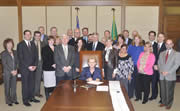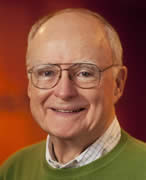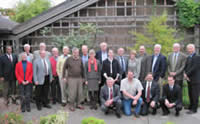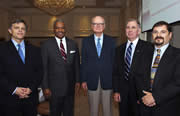The mission of the William D. Ruckelshaus Center is to act as a neutral resource for collaborative problem solving in Washington and the Pacific Northwest. The Center provides expertise to improve the quality and availability of voluntary collaborative approaches for policy development and multi-party dispute resolution. The Center is a joint effort of Washington’s two research universities. For more information, visit our website.
The William D. Ruckelshaus Center’s electronic newsletter (eNews) is published two to four times per year. If you know of someone who might be interested in receiving this eNews, please forward it to them. If you wish to be removed from the list or would like to subscribe, please email us.
Support the Center
Supporting the Center is a tax-deductible investment in the quality of life in our state and region. Donations are matched up to $100,000 per year by the Bill and Melinda Gates Foundation, and qualifies for donor credit at both WSU and UW.
Donate Now
 Center Involved in Agriculture and Critical Areas Law Implementation
Center Involved in Agriculture and Critical Areas Law Implementation
On May 16, Governor Gregoire signed ESHB 1886, creating the Voluntary Stewardship Program for protecting and enhancing environmentally critical areas on agricultural land while preserving a viable farm economy. The Washington State Conservation Commission (which the legislation designates as the lead state agency) and the parties to the agreement asked the Center to continue its involvement as they begin early implementation. With support from the National Fish and Wildlife Foundation (NFWF), the Center will remain involved during the first year of implementation, providing facilitation, consultation, strategic planning, and program and evaluation design, to help ensure a successful program launch and build capacity among the implementers. The NFWF grant also provides funding to support the American Farmland Trust’s Pioneers in Conservation Program, which includes on-the-ground projects that serve as pilots for the type of work that will occur on farmland across the State of Washington when ESHB 1886 is implemented. More information
 Bill Ruckelshaus Wins Salmon Recovery Lifetime Achievement Award (pdf)
Bill Ruckelshaus Wins Salmon Recovery Lifetime Achievement Award (pdf)
The non-profit organization Long Live the Kings (LLTK) awarded its 2011 Lifetime Achievement Award in Salmon Conservation to Bill Ruckelshaus, as a part of its 25th anniversary dinner on Thursday, November 10. The Center nominated Bill for this award, which is given to an individual who has worked–over an extended period of time and resulting in significant measurable impacts–toward the recovery of Pacific northwest salmon and steelhead. “Bill’s reach on salmon conservation has been broad and deep; he continually champions approaches that are novel, inclusive, and solutions-oriented,” said LLTK Executive Director Jacques White. “When I think of the criteria for our Lifetime Achievement Award, I really can’t imagine and individual who better meets them or is more deserving of this honor than Bill Ruckelshaus.”
 Creating a “Flight Path” for Aviation Biofuels
Creating a “Flight Path” for Aviation Biofuels
The Center has been involved with two related projects designed to promote sustainable aviation biofuels in the Pacific Northwest, to help the region meet its clean energy goals. The first was called Sustainable Aviation Biofuels Northwest (SAFN), a four-state effort to conduct a regional assessment of the challenges and opportunities associated with the production of sustainable aviation biofuel in the Northwest. The second is a $40 million, five year grant from the US Department of Agriculture (USDA) to support a team of academic and private sector researchers called the Northwest Advanced Renewables Alliance (NARA). NARA’s focus is overcoming key obstacles that prevent wood-based jet fuel and petrochemical substitutes from being economically viable. The Center’s role is to make sure project leaders (including its WSU co-directors and 11-member leadership team that includes UW researchers) interact successfully internally, and with external stakeholders.
 Center Welcomes New Board Members and University Liaisons
Center Welcomes New Board Members and University Liaisons
At the Center’s October 28 Advisory Board meeting, Board Chair Bill Ruckelshaus welcomed new members Terry Williams (The Tulalip Tribes), Michael Young (UW President), and WA Representative Hans Zeiger (R-25th District). Bill also welcomed the Center’s new UW Liaisons: Assistant Deans Stephanie Harrington (College of the Environment), Elizabeth Ford (School of Law) and Jason Smith (Evans School of Public Affairs). And Bill thanked several members who are stepping down from the Board because of new jobs or responsibilities: Megan Clubb (Baker Boyer Bank), Bill Marler (Marler Clark) and Craig Pridemore (WA Senate).
 Ruckelshaus Oral History Featured at Inaugural Chairman’s Circle Luncheon
Ruckelshaus Oral History Featured at Inaugural Chairman’s Circle Luncheon
On August 3 and 4, renowned historian Douglas Brinkley interviewed Bill Ruckelshaus to create an oral history of Bill’s life and remarkable contributions to public service, corporate leadership and collaborative policy. The project was sponsored and coordinated by the Center, with co-sponsorship by the Meridian Institute, Johnson Foundation at Wingspread, Henry M. Jackson Foundation, and TVW (which is providing the videography and post-production). Immediately following the interviews, the Center hosted its inaugural Chairman’s Circle Luncheon, where Dr. Brinkley discussed his body of work; and both he and Bill shared reflections on the oral history. Over 100 people attended. The oral history is now available from the UW and WSU libraries, and will soon be available online.
 Center Helps Agencies Work Collaboratively with Stakeholders
Center Helps Agencies Work Collaboratively with Stakeholders
As part of its efforts to build capacity for collaborative policy within the state and region, the Center provides training in collaborative problem-solving, conflict resolution and building long-term working relationships. Seasoned trainers work with agencies and organizations to tailor the curriculum to their needs. The Center looks for opportunities to team with other academic providers of training, to provide the best product, extend its capability, and avoid duplication of services. For example, the Center and WSU’s Division of Governmental Studies and Services are working with the Washington State Department of Fish and Wildlife (WDFW) to develop and deliver trainings to assist WDFW personnel in effectively managing interactions with a growing number of permit applicants. The Center also recently teamed with the National Policy Consensus Center at Portland State University to provide a three-day professional training workshop to staff at the Washington State Department of Natural Resources’ Aquatics Division.
Center Presents at National Conferences
In June 2011, the Center presented at the national conferences of two organizations devoted to collaborative public policy. The first was the University Network for Collaborative Governance, where Michael Kern teamed with Alan Foster of Triangle Associates to present the project evaluation methodology Alan developed for the Center as his master’s degree project at the UW Evans School of Public Affairs. Also on that panel were Steve Greenwood and Julia Babcock, who discussed project evaluation efforts at the Oregon Solutions Program at Portland State University. The second presentation was a panel discussion that Michael moderated at the Association for Conflict Resolution’s Environment and Public Policy Section conference. The panel focused on the similarities and differences involved in providing conflict resolution services from different institutional settings (academic, non-profit, private firm, sole practitioner, government agency). The panel included Cindy Cook, principal of Adamant Accord, Inc.; John Ehrmann, co-founder and Senior Partner at the Meridian Institute; Bill Ross, President of Ross & Associates; Steve Smutko, Spicer Chair in Collaborative Practice in the Environment and Natural Resources Program at the University of Wyoming; and Elissa Tonkin, an experienced mediator and facilitator with the United States Environmental Protection Agency’s Boston Office.
Remember the Center in Your Year-End Giving
Gifts from individuals and organizations provide the financial independence that reinforces the Center’s neutrality and ability to quickly respond to areas of need. Through the Center, the universities are contributing to the resolution of important and thorny policy challenges. We hope you will remember the Center in your year-end giving. Your gift is eligible for donor credit at WSU and/or UW, and will be matched by the Bill and Melinda Gates Foundation. Gifts of $1,000 or more qualify you for the Chairman’s Circle (a group of the Center’s most dedicated supporters) and invitation to events like the Chairman’s Circle luncheon described above. The easiest way to donate online or you can contact the Center at (509) 335-2937 or E-mail.
To remove your name from our mailing list, please email us
Questions or comments? Please call (509) 335-2937 or E-mail